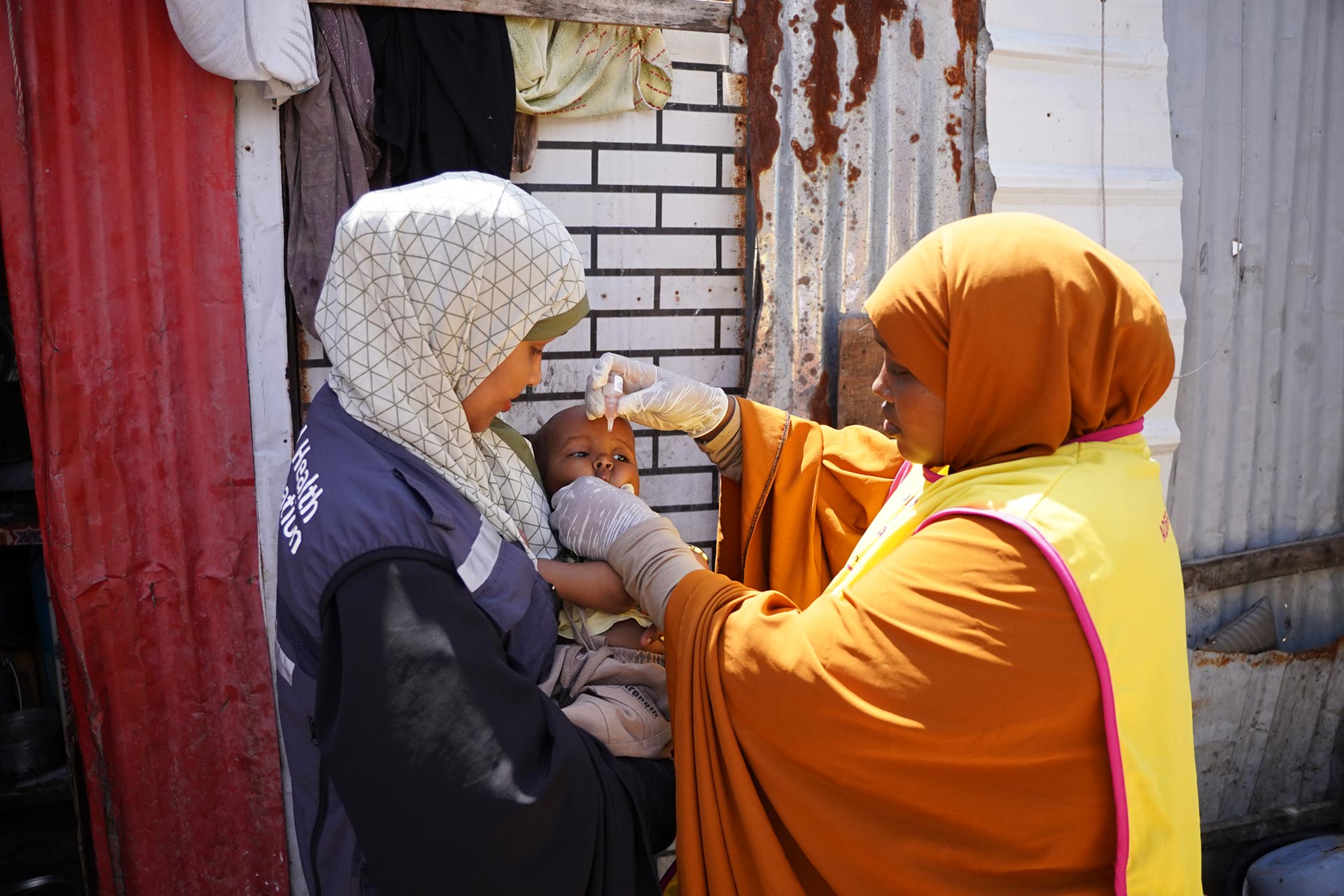 15 July 2025, Mogadishu, Somalia – The annual World Health Organization (WHO)/United Nations Children’s Fund (UNICEF) Estimates of National Immunization Coverage (WUENIC) released today reports that 70% of children in Somalia are fully vaccinated, an increase of 28% between 2012 to 2024, with steady improvements registered across all antigens since 2019.
15 July 2025, Mogadishu, Somalia – The annual World Health Organization (WHO)/United Nations Children’s Fund (UNICEF) Estimates of National Immunization Coverage (WUENIC) released today reports that 70% of children in Somalia are fully vaccinated, an increase of 28% between 2012 to 2024, with steady improvements registered across all antigens since 2019.
WUENIC presents country level immunization datasets on key infant and childhood vaccinations, allowing the identification of areas where progress has been made, where opportunities remain and where immunization coverage has declined.
Somalia has invested heavily in upping coverage rates. In 2024, the accelerated Big Catch-Up initiative, spearheaded by the Federal Ministry of Health and Human Services in collaboration with UNICEF and WHO, targeted zero-dose children – those who have never received a single vaccine – and children with partial (incomplete) vaccination. This year, multiple vaccination campaigns have been held, and pneumococcal conjugate vaccine (PCV) and rotavirus vaccines introduced to address childhood pneumonia and diarrhoea, the leading causes of death in children under 5 in Somalia.
“Immunization is one of the most cost-effective public health interventions that prevents vaccine-preventable diseases,” said Minister of Health and Human Services H.E. Dr. Ali Haji Adam. “To continue strengthening the health system in Somalia we must enhance the capabilities of our frontline health workers and increase efforts to create awareness in communities about lifesaving vaccines. We all have more work to do.”
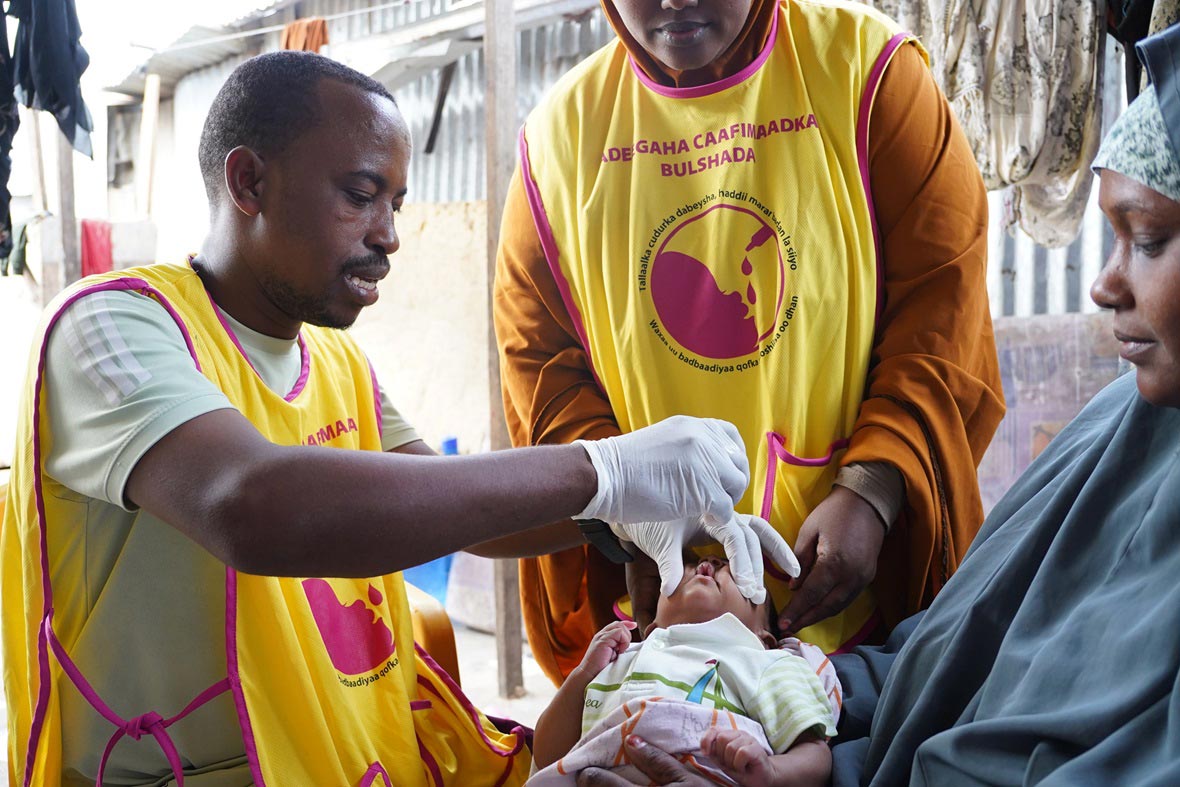 Expanding routine immunization coverage in Somalia has long been hampered by ongoing conflict, displacement, inaccessibility and limited health infrastructure. For decades coverage was below 50%, leaving an estimated 1.5 million children missing out on vaccines. It is encouraging to note that through the Big Catch-Up, nearly 700 000 zero-dose children received their first dose of pentavalent vaccine which protects against potentially fatal diseases like diphtheria and whooping cough.
Expanding routine immunization coverage in Somalia has long been hampered by ongoing conflict, displacement, inaccessibility and limited health infrastructure. For decades coverage was below 50%, leaving an estimated 1.5 million children missing out on vaccines. It is encouraging to note that through the Big Catch-Up, nearly 700 000 zero-dose children received their first dose of pentavalent vaccine which protects against potentially fatal diseases like diphtheria and whooping cough.
“Alongside the Big Catch-Up campaigns, Somalia has strengthened routine immunization through outreach to underserved areas in collaboration with neighbouring countries, and with the recent introduction of 2 new lifesaving vaccines, PCV and rotavirus. These efforts are vital, as over 1.5 million children have missed essential vaccines. Intensified action continues to address the ongoing polio outbreak that began in 2017,” said WHO Representative in Somalia Dr Renee Van de Weerdt.
Reliable data is a crucial pillar of any health system. To strengthen data quality, UNICEF, in collaboration with WHO, supported the Federal Ministry of Health in conducting a nationwide data quality improvement exercise across all districts and health facilities. This initiative, combined with investments in the overall immunization system and advocacy efforts, resulted in a significant improvement in data quality and vaccination rates.
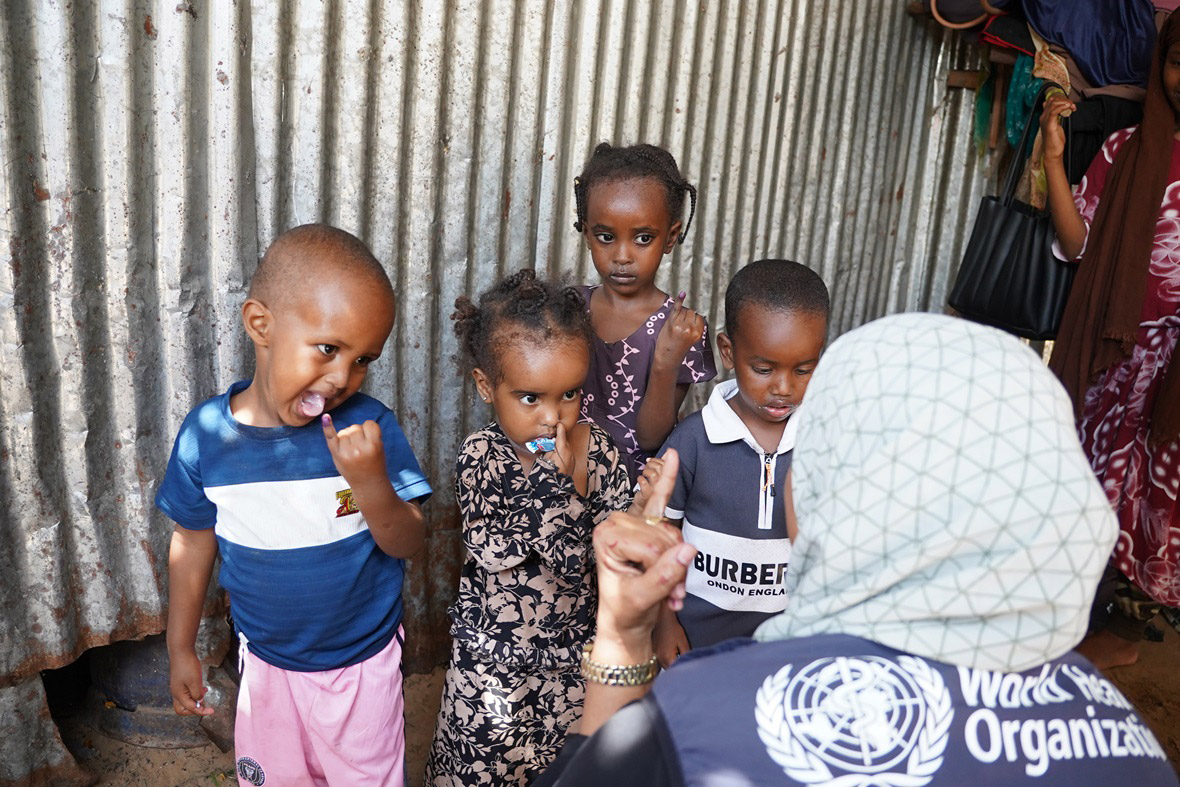 “Investments and coordinated efforts to strengthen Somalia’s child immunization programme are yielding high results,” said UNICEF Acting Representative in Somalia Nisar Syed. “For example, UNICEF is leading on improving vaccine storage capacity and the ability to keep them at the right temperature. To date, 90% of health facilities providing vaccinations have been equipped with solar-powered refrigeration. Together with the ministries of health, our dedicated partners and resilient health workers, children are being reached with lifesaving vaccines, even in some of the most difficult and hard-to-reach places.”
“Investments and coordinated efforts to strengthen Somalia’s child immunization programme are yielding high results,” said UNICEF Acting Representative in Somalia Nisar Syed. “For example, UNICEF is leading on improving vaccine storage capacity and the ability to keep them at the right temperature. To date, 90% of health facilities providing vaccinations have been equipped with solar-powered refrigeration. Together with the ministries of health, our dedicated partners and resilient health workers, children are being reached with lifesaving vaccines, even in some of the most difficult and hard-to-reach places.”
WUENIC 2024 findings that the number of zero-dose children has decreased in countries that, like Somalia, are supported by Gavi, the Vaccine Alliance, underscores the importance of investing in immunization. Key partners, including the Global Polio Eradication Initiative (GPEI), the UK Foreign, Commonwealth and Development Office (FCDO), the World Bank and the Gates Foundation have been instrumental in improving child survival rates.
Now is the time to build on these gains and sustain momentum towards the Immunization Agenda 2030 which aims to ensure that everyone, everywhere, at every age, fully benefits from vaccines to improve health and well-being.
For more information, contact:
Mohamed Osman, Federal Ministry of Health and Human Services Head of Communication and Public Engagement, Cette adresse email est protégée contre les robots des spammeurs, vous devez activer Javascript pour la voir.
Lisa Hill, UNICEF Somalia Communication Specialist, Cette adresse email est protégée contre les robots des spammeurs, vous devez activer Javascript pour la voir.
Khadar Hared, WHO Somalia Communication Officer, Cette adresse email est protégée contre les robots des spammeurs, vous devez activer Javascript pour la voir.
Notes to editors:
WHO dataset: Global dashboard, country profiles, additional resources
UNICEF dataset: Overview, Full datasets, Data visualisation, Regional data visualisation, Country profiles





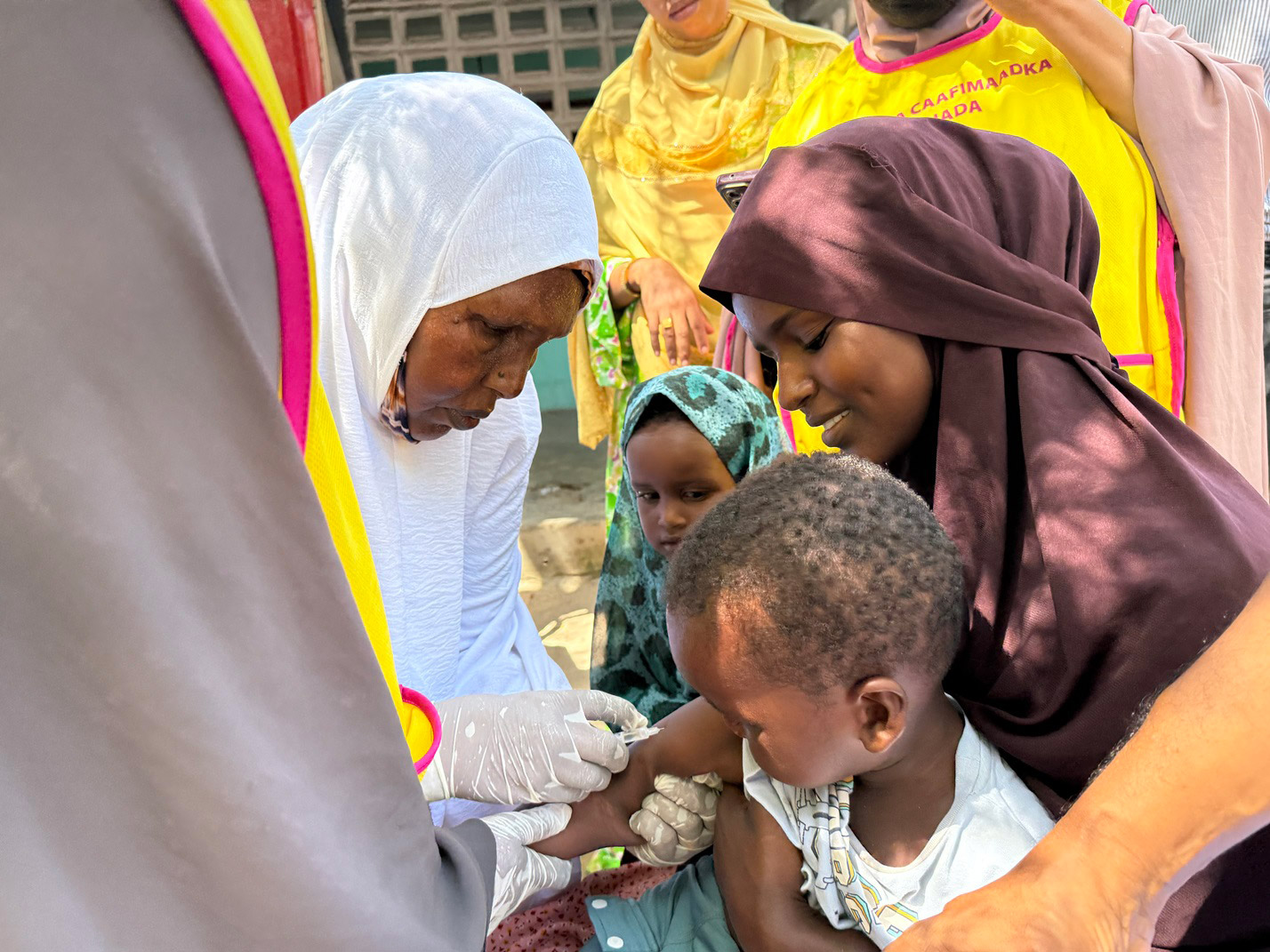 30 June 2025, Mogadishu, Somalia – Mothers visited the Hamar Jajab Maternal and Child Health Centre in Banadir region on a hot morning in May, babies cradled in one arm, toddlers clinging to the other, to join the queues of caregivers waiting under the shade of a big tree inside the facility, all hoping to get their children vaccinated.
30 June 2025, Mogadishu, Somalia – Mothers visited the Hamar Jajab Maternal and Child Health Centre in Banadir region on a hot morning in May, babies cradled in one arm, toddlers clinging to the other, to join the queues of caregivers waiting under the shade of a big tree inside the facility, all hoping to get their children vaccinated. Mulki Osman Ali, a 26-year-old mother of 2 – a son aged 2 and a daughter just over one-and-a-half years old – was among the mothers present at the health centre in Hamar Jajab. She explained this was the first time her children had the opportunity to receive the PCV and rotavirus vaccines.
Mulki Osman Ali, a 26-year-old mother of 2 – a son aged 2 and a daughter just over one-and-a-half years old – was among the mothers present at the health centre in Hamar Jajab. She explained this was the first time her children had the opportunity to receive the PCV and rotavirus vaccines.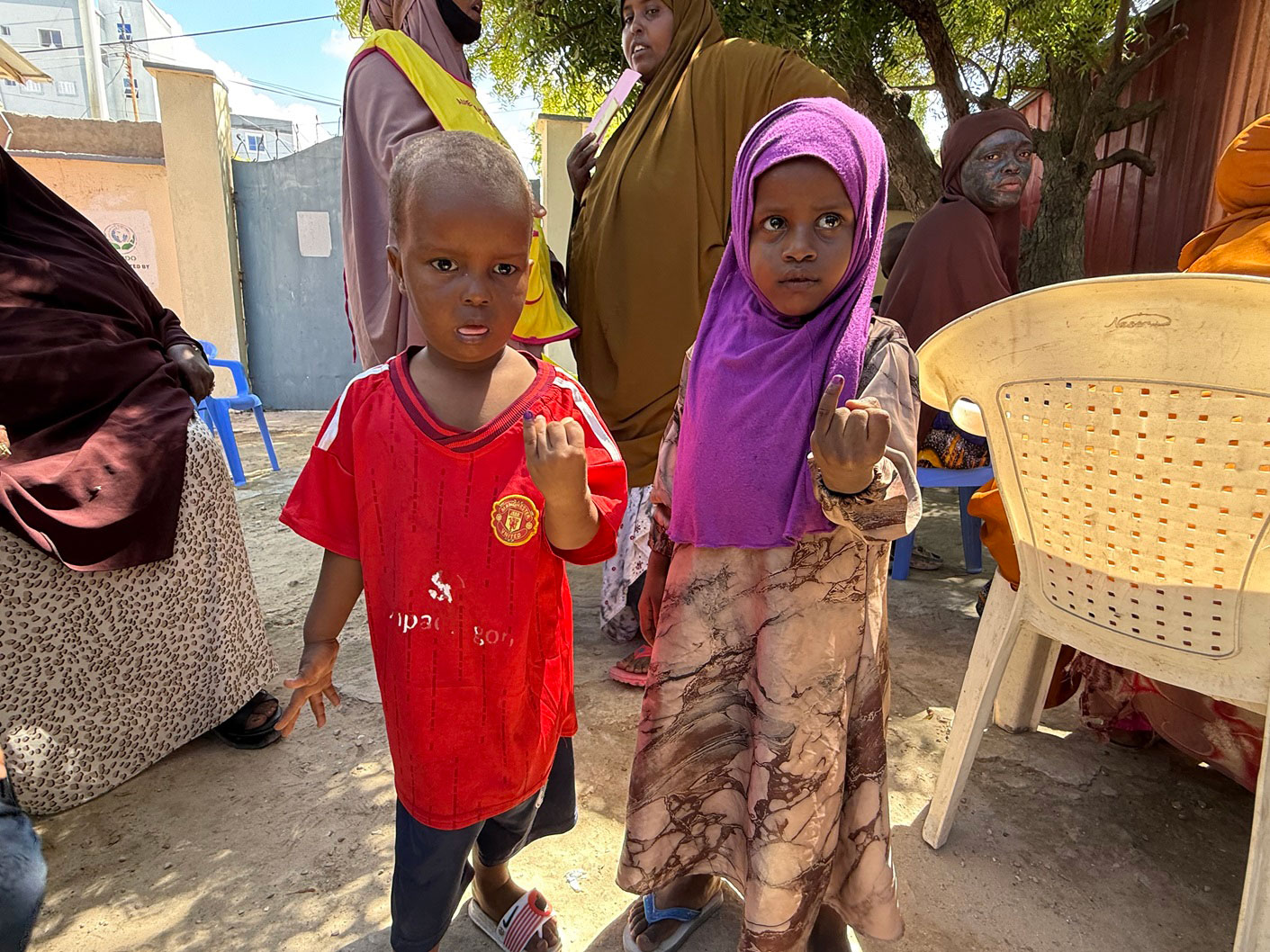 Community trust in local health workers is a cornerstone of successful vaccination efforts, in a society where both parents play crucial roles in ensuring children can access health care.
Community trust in local health workers is a cornerstone of successful vaccination efforts, in a society where both parents play crucial roles in ensuring children can access health care. 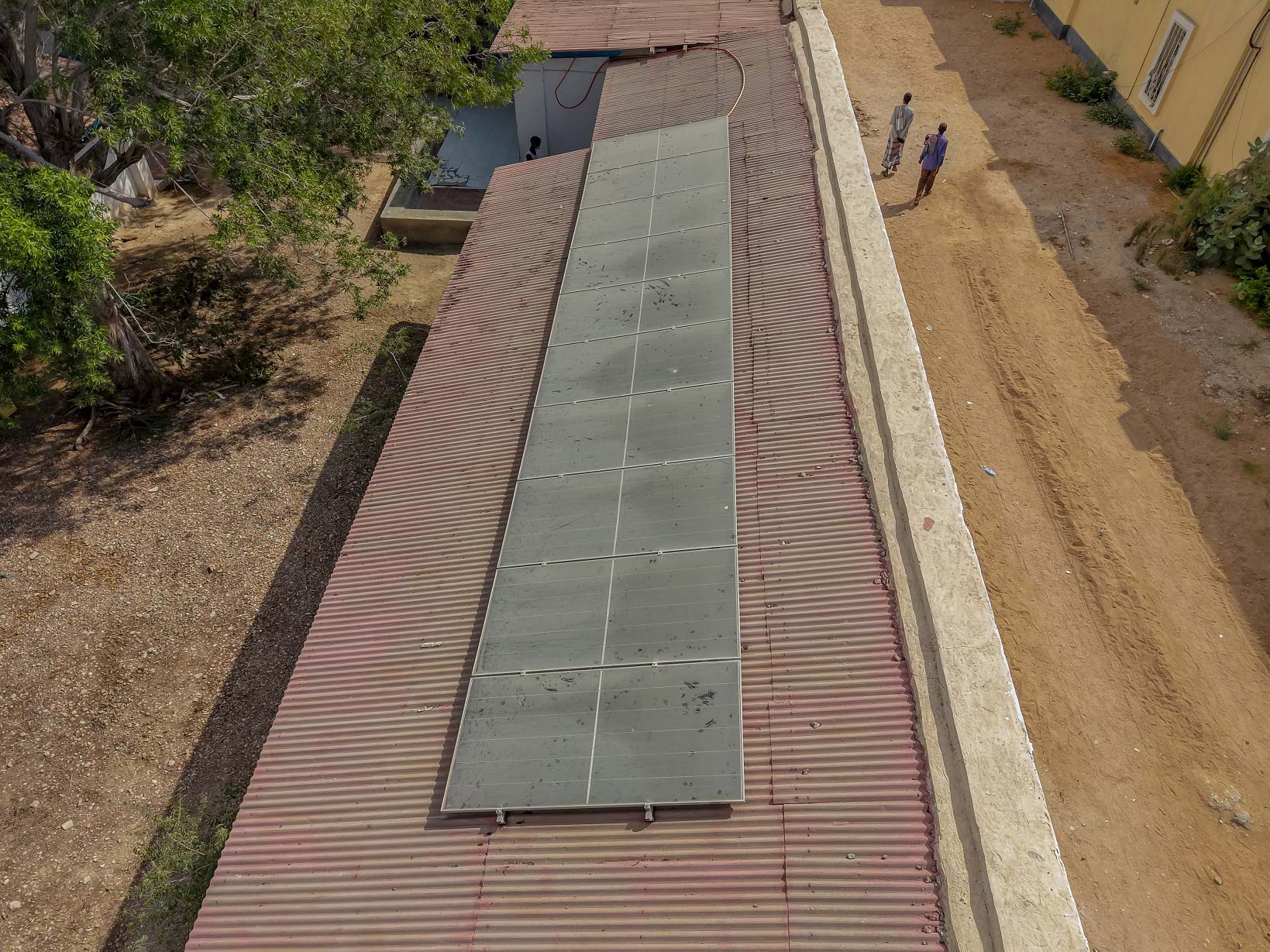 12 May 2025, Mogadishu, Somalia – As the world marks Immunization Week 2025, a powerful story of innovation and impact is emerging from Somalia’s coastal city of Berbera. Once affected by frequent power outages that jeopardized the delivery of essential health services, Berbera’s hospitals are now running around the clock thanks to newly installed solar battery systems supported by the King Salman Humanitarian Aid and Relief Centre (KSrelief) and WHO Somalia.
12 May 2025, Mogadishu, Somalia – As the world marks Immunization Week 2025, a powerful story of innovation and impact is emerging from Somalia’s coastal city of Berbera. Once affected by frequent power outages that jeopardized the delivery of essential health services, Berbera’s hospitals are now running around the clock thanks to newly installed solar battery systems supported by the King Salman Humanitarian Aid and Relief Centre (KSrelief) and WHO Somalia.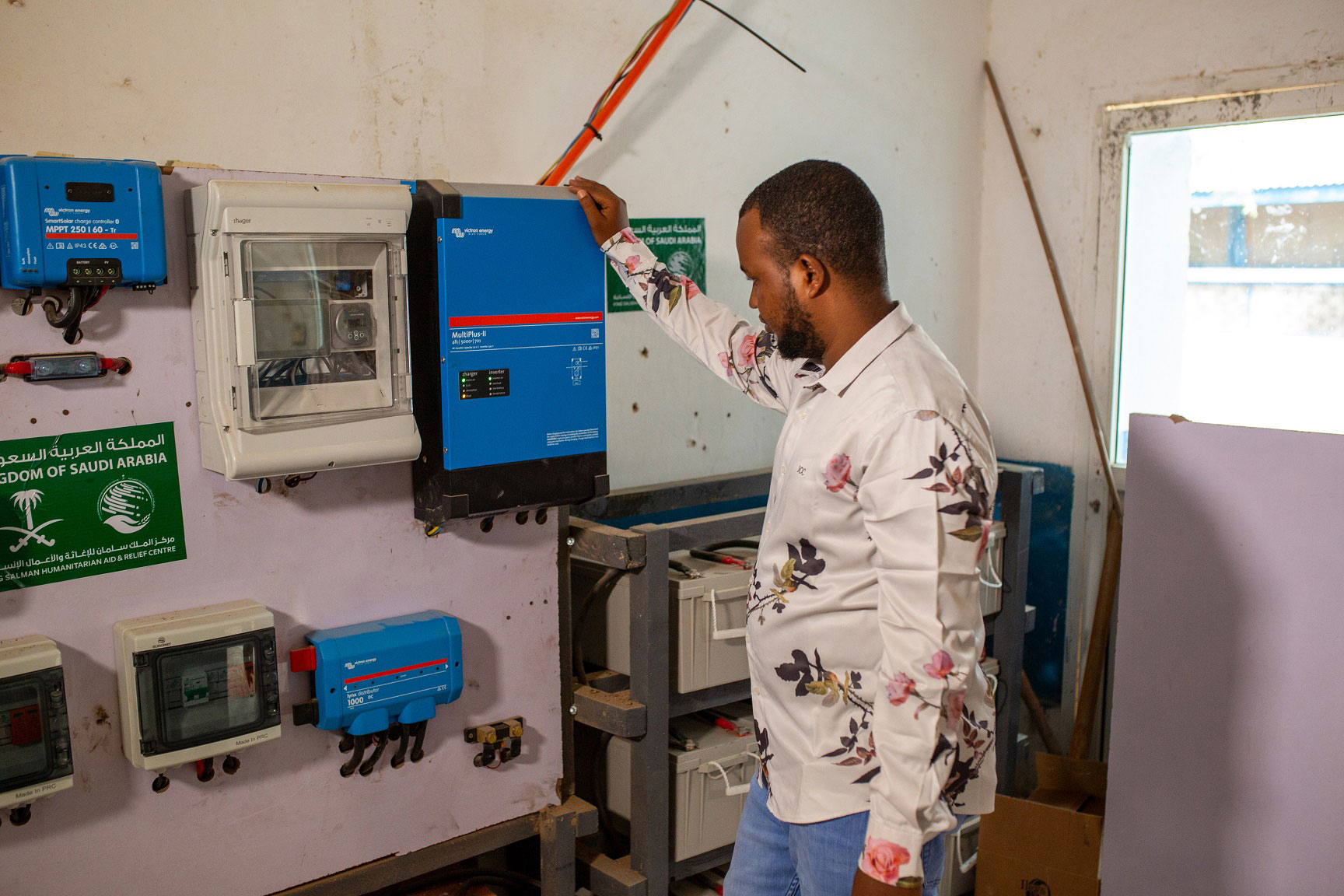 Power disruptions once hindered lab tests, delayed diagnoses, and threatened the integrity of vaccines stored in hospital refrigerators. Today, solar power ensures that machines, refrigerators, and air conditioning systems run continuously, supporting accurate diagnostics and consistent immunization services.
Power disruptions once hindered lab tests, delayed diagnoses, and threatened the integrity of vaccines stored in hospital refrigerators. Today, solar power ensures that machines, refrigerators, and air conditioning systems run continuously, supporting accurate diagnostics and consistent immunization services.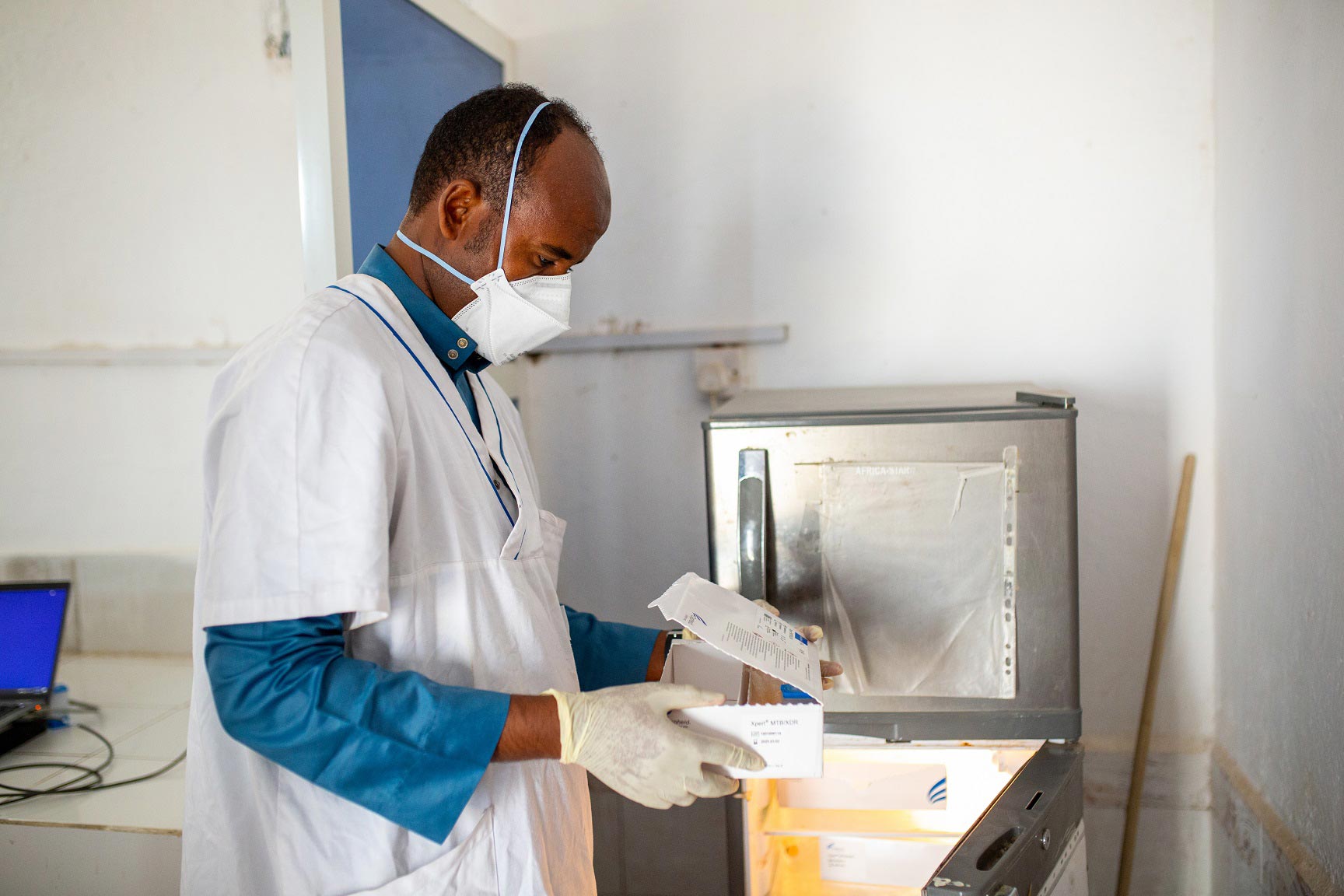 “This solar system is available 24/7, making the diagnosing process easier than before by reducing the waiting time at reception,” adds Mursal Ahmed Jama. “That means children and families can be served more efficiently.”
“This solar system is available 24/7, making the diagnosing process easier than before by reducing the waiting time at reception,” adds Mursal Ahmed Jama. “That means children and families can be served more efficiently.”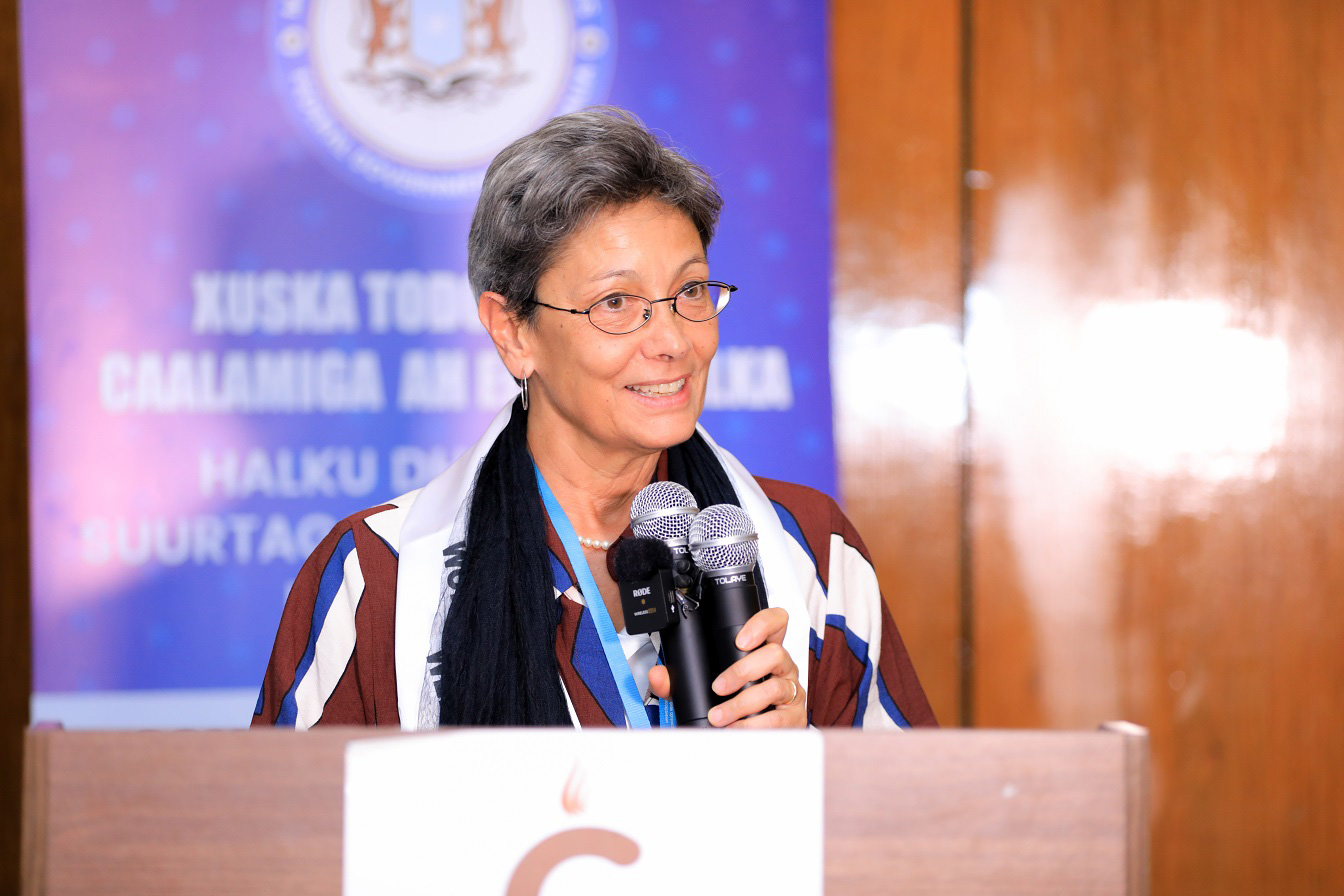 1 May 2025, Mogadishu, Somalia – This week, the Federal Government of Somalia, in collaboration with WHO Somalia, the United Nations Children’s Fund (UNICEF), Gavi and other partners, joined hundreds of countries worldwide to mark World Immunization Week under the theme “Immunization for All is Humanly Possible”.
1 May 2025, Mogadishu, Somalia – This week, the Federal Government of Somalia, in collaboration with WHO Somalia, the United Nations Children’s Fund (UNICEF), Gavi and other partners, joined hundreds of countries worldwide to mark World Immunization Week under the theme “Immunization for All is Humanly Possible”.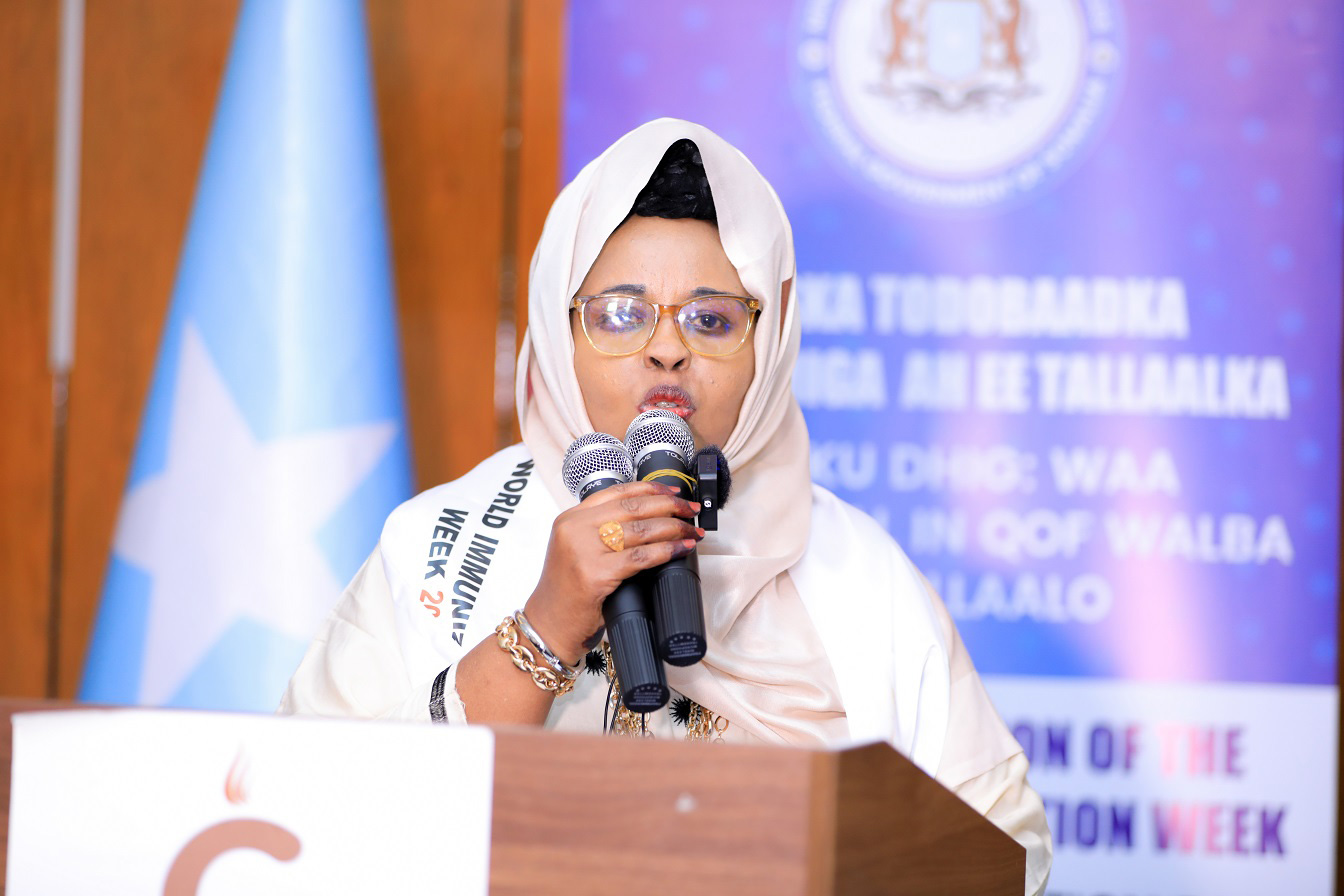 H.E. Dr Maryama Mohamed Hussein, State Minister of Health and Human Services of the Federal Government of Somalia, addressed the gathering, emphasizing the urgent need to strengthen vaccination efforts to safeguard the future of Somali children. In her speech, she stated: “The Ministry of Health is ready to work with all stakeholders to ensure children are protected fully from vaccine preventable diseases, especially now that we have the vaccines needed to save lives.”
H.E. Dr Maryama Mohamed Hussein, State Minister of Health and Human Services of the Federal Government of Somalia, addressed the gathering, emphasizing the urgent need to strengthen vaccination efforts to safeguard the future of Somali children. In her speech, she stated: “The Ministry of Health is ready to work with all stakeholders to ensure children are protected fully from vaccine preventable diseases, especially now that we have the vaccines needed to save lives.”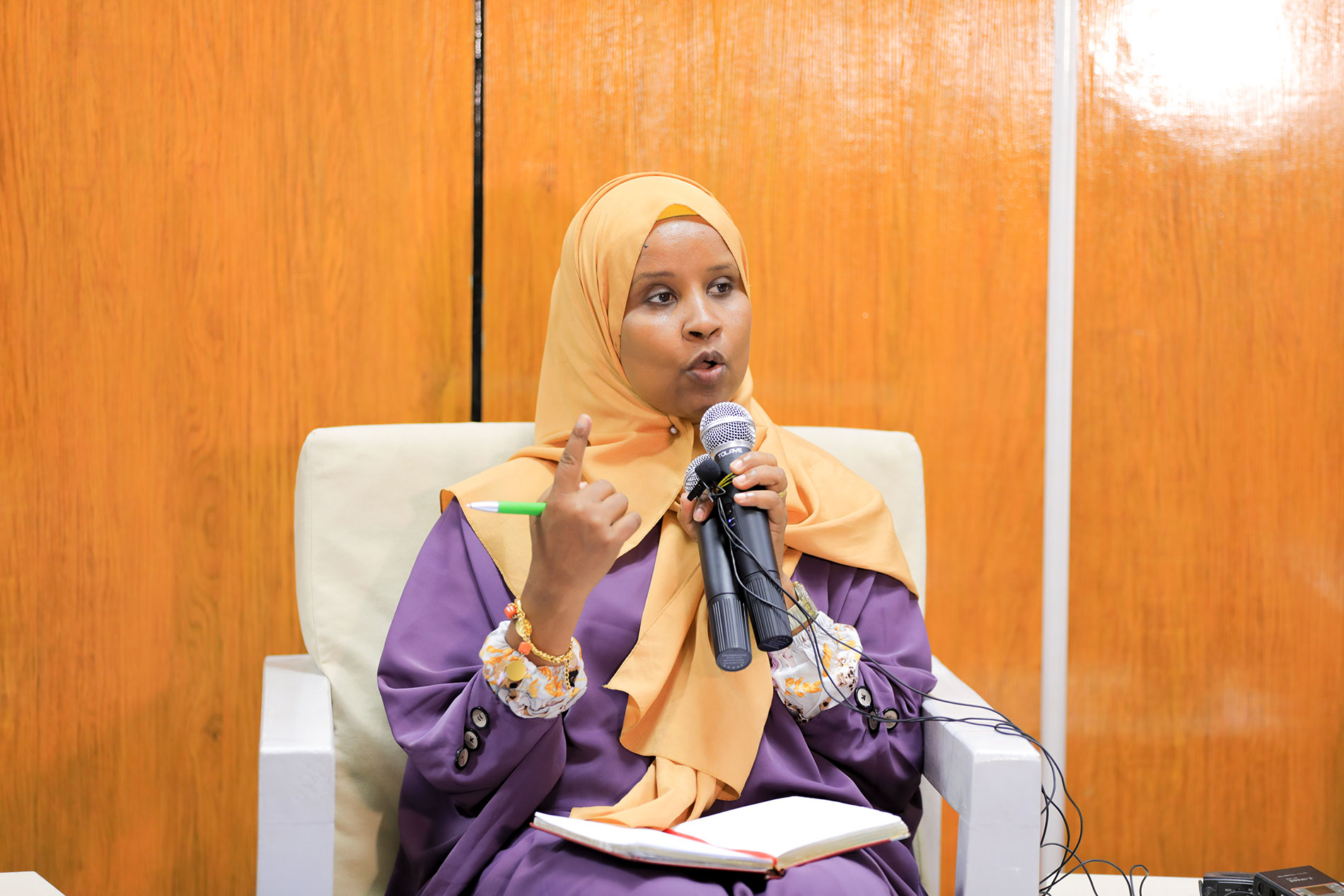 1"A dose of good news this year," said UNICEF advocacy specialist Dr Ubah Farah. "These 2 vaccines will address 2 of the leading causes of death among children under 5 – pneumonia and diarrhoea. UNICEF is pleased to be part of this effort by bringing into the country 2.5 million doses of the pneumococcal vaccine and 1.2 million doses of the rotavirus vaccine. Together with the Ministry of Health and other partners we will facilitate their rollout to communities and ensure they reach every child."
1"A dose of good news this year," said UNICEF advocacy specialist Dr Ubah Farah. "These 2 vaccines will address 2 of the leading causes of death among children under 5 – pneumonia and diarrhoea. UNICEF is pleased to be part of this effort by bringing into the country 2.5 million doses of the pneumococcal vaccine and 1.2 million doses of the rotavirus vaccine. Together with the Ministry of Health and other partners we will facilitate their rollout to communities and ensure they reach every child."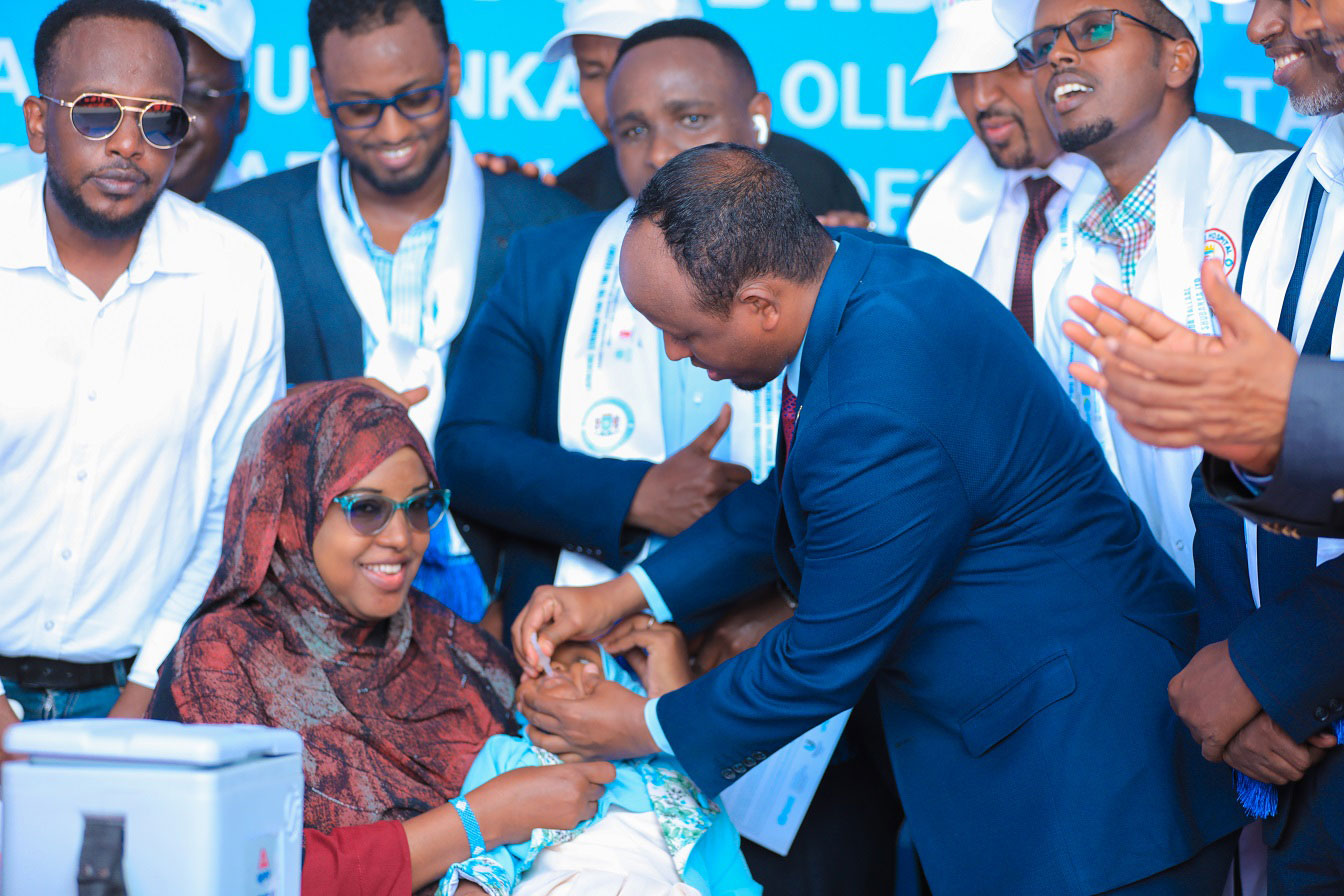 The Somali Ministry of Health and Human Services is leading this effort with support from Gavi, the Vaccine Alliance, the World Health Organization (WHO) and the United Nations Children's Fund (UNICEF). It comes at a critical time, as Somalia grapples with persistent measles outbreaks and deaths caused by pneumonia and rotavirus-related diarrhoea. Together, measles, pneumonia, and diarrhea account for an estimated 43% of child deaths in the country.
The Somali Ministry of Health and Human Services is leading this effort with support from Gavi, the Vaccine Alliance, the World Health Organization (WHO) and the United Nations Children's Fund (UNICEF). It comes at a critical time, as Somalia grapples with persistent measles outbreaks and deaths caused by pneumonia and rotavirus-related diarrhoea. Together, measles, pneumonia, and diarrhea account for an estimated 43% of child deaths in the country.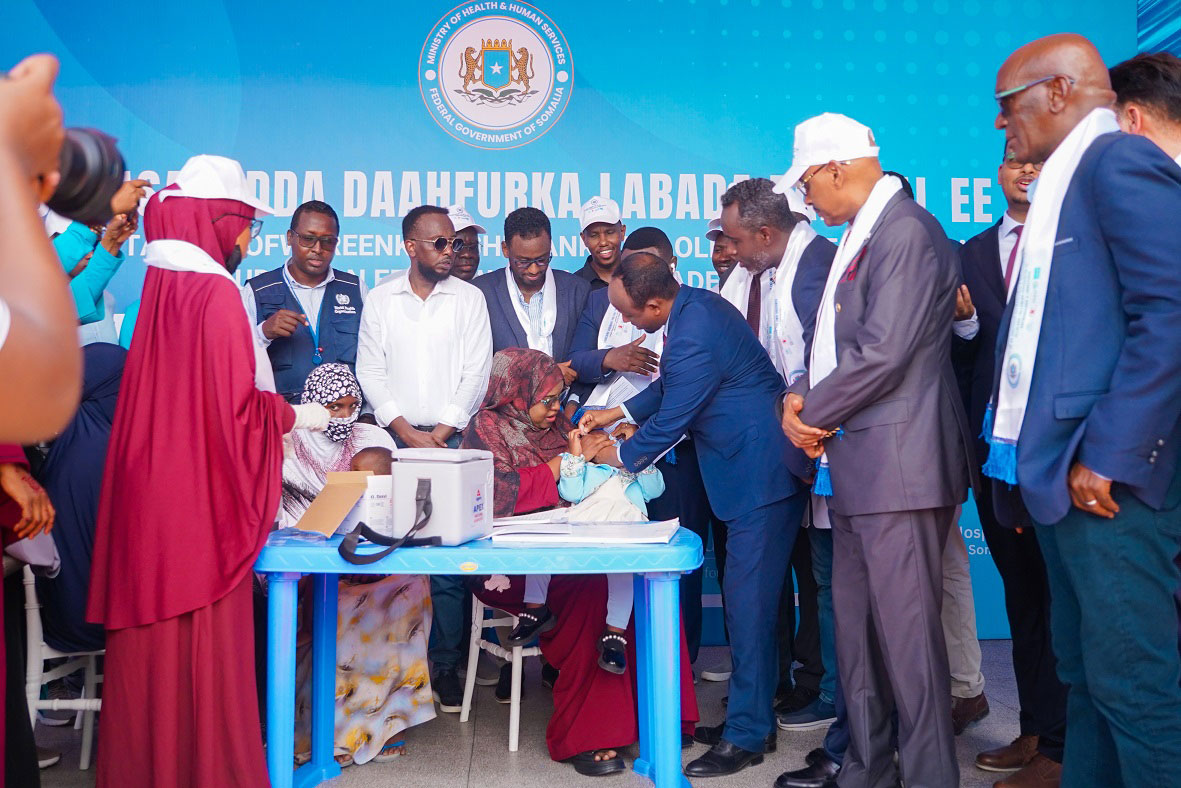 Pneumococcal infections can cause serious conditions such as pneumonia, meningitis and septicemia. Rotavirus is a leading cause of severe diarrhoea and dehydration, contributing significantly to malnutrition and mortality in children. Countries that have introduced PCV into their routine immunization programmes have reported marked declines in hospitalizations and deaths among children.
Pneumococcal infections can cause serious conditions such as pneumonia, meningitis and septicemia. Rotavirus is a leading cause of severe diarrhoea and dehydration, contributing significantly to malnutrition and mortality in children. Countries that have introduced PCV into their routine immunization programmes have reported marked declines in hospitalizations and deaths among children.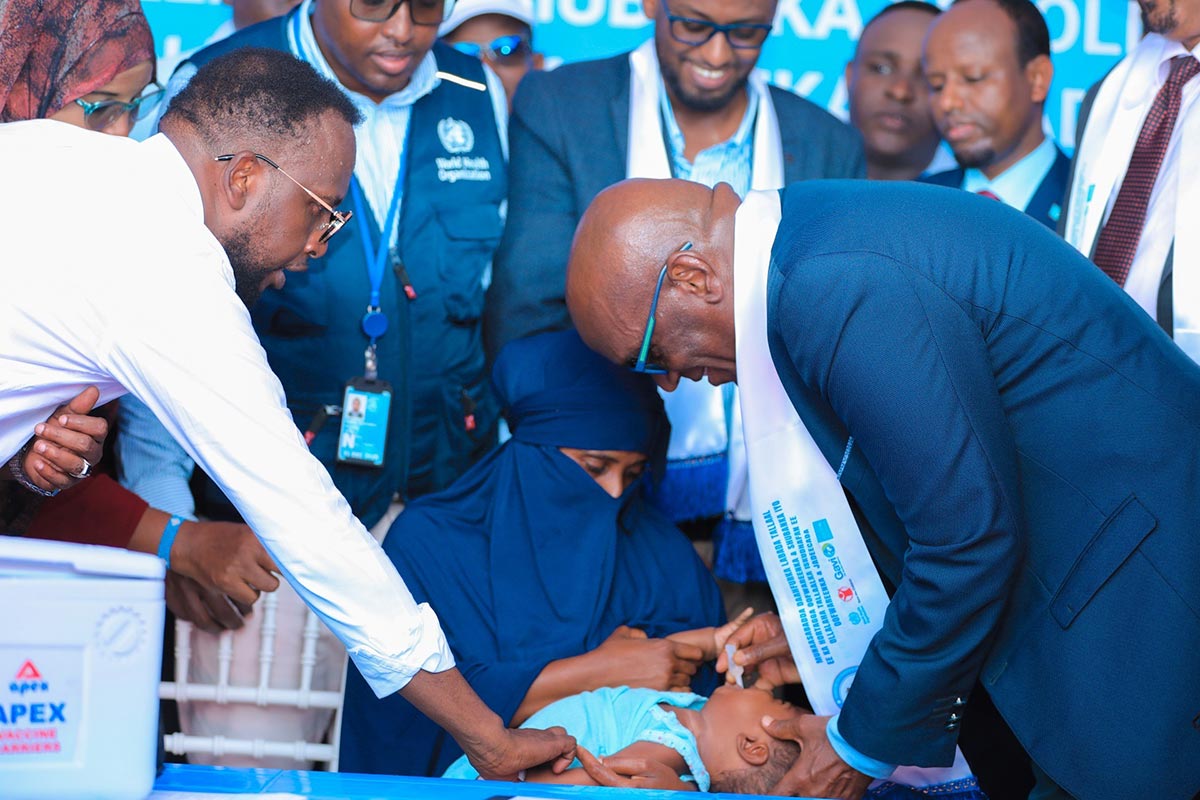 The measles catch-up campaign is designed to rapidly close immunity gaps among children who have missed routine vaccinations due to insecurity, displacement and service disruptions. The campaign aims to reach millions of children across the country, protecting them from one of the most contagious and deadly vaccine-preventable diseases.
The measles catch-up campaign is designed to rapidly close immunity gaps among children who have missed routine vaccinations due to insecurity, displacement and service disruptions. The campaign aims to reach millions of children across the country, protecting them from one of the most contagious and deadly vaccine-preventable diseases.